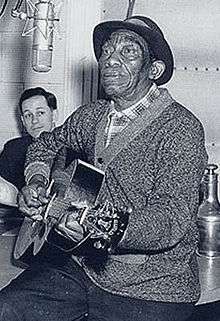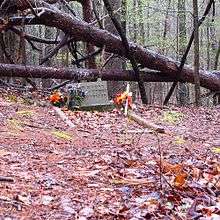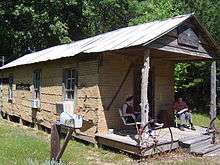Mississippi John Hurt
| Mississippi John Hurt | |
|---|---|
 Hurt making a recording for the Library of Congress in 1964 | |
| Background information | |
| Birth name | John Smith Hurt |
| Born |
March 8, 1892 or 1893 Teoc, Carroll County, Mississippi, United States |
| Origin | Avalon, Mississippi |
| Died |
November 2, 1966 (aged 73-74) Grenada, Mississippi, US |
| Genres |
Piedmont blues, Country blues, Delta blues, Folk |
| Occupation(s) |
Singer-songwriter, Sharecropper, Farm hand |
| Instruments | Guitar, vocals |
| Years active | 1928, 1963 – 1966 |
| Labels |
Okeh Vanguard |
| Associated acts |
Shell Smith Willie Narmour |
| Notable instruments | |
| Guild F-30NT | |
John Smith Hurt, better known as Mississippi John Hurt (possibly March 3, 1892 or March 8, 1893[1][nb 1] – November 2, 1966) was an American country blues singer and guitarist.[4]
Raised in Avalon, Mississippi, Hurt taught himself how to play the guitar around age nine. He worked as a sharecropper and began playing at dances and parties, singing to a melodious fingerpicked accompaniment.[5] His first recordings, made for Okeh Records in 1928, were commercial failures, and he continued to work as a farmer. Tom Hoskins, a blues enthusiast, located Hurt in 1963 and persuaded him to move to Washington, D.C., where he was recorded by the Library of Congress in 1964. This helped further the American folk music revival, which had led to the rediscovery of many other bluesmen of Hurt's era. Hurt performed on the university and coffeehouse concert circuit with other Delta blues musicians brought out of retirement. He also recorded several albums for Vanguard Records.
Hurt died in Grenada, Mississippi. Material recorded by him has been re-released by many record labels, and his songs have been recorded by Bob Dylan, Dave Van Ronk, Jerry Garcia, Beck, Doc Watson, John McCutcheon, Taj Mahal, Bruce Cockburn, David Johansen, Bill Morrissey, Gillian Welch, Josh Ritter, Guthrie Thomas, Parsonsfield, and Rory Block.[6]
Biography
Early years
Hurt was born in Teoc,[7] Carroll County, Mississippi, and raised in Avalon, Mississippi. He taught himself to play guitar at the age of nine, stealthily playing the guitar of a friend of his mother's, who often stayed at the Hurt home while courting a woman who lived nearby. As a youth he played old-time music for friends and at dances. He worked as a farmhand into the 1920s.[8] His fast, highly syncopated style of playing was meant for dancing. On occasion, a medicine show would come through the area, and Hurt recalled that one of them wanted to hire him: "One of them wanted me, but I said no because I just never wanted to get away from home."[7] In 1923 he played with the fiddle player Willie Narmour as a substitute for Narmour's regular partner, Shell Smith.[8]
First recordings
When Narmour got a chance to record for Okeh Records as a prize for winning first place in a 1928 fiddle contest, he recommended Hurt to Okeh producer Tommy Rockwell. After auditioning "Monday Morning Blues" at his home, Hurt took part in two recording sessions, in Memphis and New York City (see Discography below).[8] While in Memphis, he recalled seeing "many, many blues singers ... Lonnie Johnson, Blind Lemon Jefferson, Bessie Smith, and lots, lots more."[7] Hurt described his first recording session as follows:
... a great big hall with only the three of us in it: me, the man [Rockwell], and the engineer. It was really something. I sat on a chair, and they pushed the microphone right up to my mouth and told me that I couldn't move after they had found the right position. I had to keep my head absolutely still. Oh, I was nervous, and my neck was sore for days after.[7]
Hurt attempted further negotiations with Okeh to record again, but his records were commercial failures. Okeh went out of business during the Great Depression, and Hurt returned to Avalon and obscurity, working as a sharecropper and playing at local parties and dances.[5]
Rediscovery and death

Hurt's renditions of "Frankie" and "Spike Driver Blues" were included in The Anthology of American Folk Music in 1952, and a copy of "Avalon Blues" was discovered by an Australian man. Both events stimulated an interest in finding Hurt.[9] In 1963, the folk musicologist Tom Hoskins, supervised by Richard Spottswood, located Hurt near Avalon, Mississippi, guided by the lyrics of "Avalon Blues":[9]
Avalon, my home town, always on my mind / Avalon, my home town.
While in Avalon, Hoskins persuaded an apprehensive Hurt to perform several songs for him, to ensure that he was genuine.[9] Hoskins was convinced and, seeing that Hurt's guitar playing skills were still intact, encouraged him to move to Washington, D.C., and perform for a broader audience. His performance at the 1963 Newport Folk Festival caused his star to rise in the folk revival occurring at that time.[5] He performed extensively at colleges, concert halls, and coffeehouses and appeared on The Tonight Show Starring Johnny Carson. He also recorded three albums for Vanguard Records.[5] Much of his repertoire was also recorded for the Library of Congress. His fans particularly liked the ragtime songs "Salty Dog" and "Candy Man" and the blues ballads "Spike Driver Blues" (a variant of "John Henry") and "Frankie".[5]
Hurt's influence spanned several music genres, including blues, spirituals, country, bluegrass, folk, and contemporary rock and roll. A soft-spoken man, his nature was reflected in the work, which consisted of a mellow mix of country, blues, and old-time music.[8]
Hurt died on November 2, 1966, of a heart attack, in hospital at Grenada, Mississippi.[1]
Style
Hurt used a fast, syncopated fingerpicking style of guitar playing that he taught himself. He was influenced by few other musicians, among whom was an elderly, unrecorded blues singer from the area where he lived, Rufus Hanks, who played twelve-string guitar and harmonica.[7] He also recalled listening to the country singer Jimmie Rodgers. On occasion, Hurt would use an open tuning and a slide, as he did in his arrangement of "The Ballad of Casey Jones".[7][9] According to the music critic Robert Christgau, "the school of John Fahey proceeded from his finger-picking, and while he's not the only quietly conversational singer in the modern folk tradition, no one else has talked the blues with such delicacy or restraint."[10]
Tributes

There is a memorial to Hurt in Avalon, Mississippi. It is parallel to RR2, the rural road on which he grew up.
The American singer-songwriter Tom Paxton, who met Hurt and played on the same bill with him at the Gaslight in Greenwich Village around 1963, wrote and recorded a song about him in 1977, "Did You Hear John Hurt?", which he still frequently plays in live performances.
The first track of John Fahey's 1968 solo acoustic guitar album, Requia, is "Requiem for John Hurt". Fahey's posthumous live album, The Great Santa Barbara Oil Slick, also features a version of the piece, entitled "Requiem for Mississippi John Hurt".
The British folk and blues artist Wizz Jones recorded a tribute song, "Mississippi John", for his 1977 album Magical Flight.
The Delta blues artist Rory Block recorded the album Avalon: A Tribute to Mississippi John Hurt, released in 2013 as part of her "Mentor Series".[6]
The New England singer-songwriter Bill Morrissey released the Grammy-nominated album Songs of Mississippi John Hurt in 1999.
Discography
Sources for this section are as follows:[11][12][13][14]
78-rpm releases
- "Frankie"/"Nobody's Dirty Business" (Okeh Records, OKeh 8560), 1928
- "Stack O' Lee"/"Candy Man Blues" (Okeh Records, OKeh 8654), 1928
- "Blessed Be the Name"/"Praying on the Old Camp Ground" (Okeh Records, OKeh 8666), 1928
- "Blue Harvest Blues"/"Spike Driver Blues" (Okeh Records, OKeh 8692), 1928
- "Louis Collins"/"Got the Blues (Can't Be Satisfied)" (Okeh Records, OKeh 8724), 1928
- "Ain't No Tellin'"/"Avalon Blues" (Okeh Records, OKeh 8759), 1928
Albums
- Folk Songs and Blues, live recordings (Piedmont Records, PLP 13757), 1963
- Worried Blues (Piedmont Records, PLP 13161), 1964
- Today! (Vanguard Records, VSD-79220), 1966
- The Immortal Mississippi John Hurt (Vanguard Records, VSD-79248), 1967
- The Best of Mississippi John Hurt, live recordings (Vanguard Records, VSD-19/20), 1970
- Last Sessions (Vanguard Records, VSD-79327), 1972
- Volume One of a Legacy, live recordings (Piedmont Records, CLPS 1068), 1975
- Monday Morning Blues: The Library of Congress Recordings, vol. 1 (Flyright Records, FLYLP 553), 1980
- Avalon Blues: The Library of Congress Recordings, vol. 2 (Heritage Records, HT-301), 1982
- Satisfied, live recordings (Quicksilver Intermedia, QS 5007), 1982
- The Candy Man, live recordings (Quicksilver Intermedia, QS 5042), 1982
- Sacred and Secular: The Library of Congress Recordings, vol. 3 (Heritage Records, HT-320), 1988
- Avalon Blues (Flyright Records, FLYCD 06), 1989
- Memorial Anthology, live recordings (Genes Records, GCD 9906/7), 1993
Selected compilation albums
- The Original 1928 Recordings (Spokane Records, SPL 1001), 1971
- 1928: Stack O' Lee Blues – His First Recordings (Biograph Records, BLP C4), 1972
- 1928 Sessions (Yazoo Records, L 1065), 1979
- Satisfying Blues (Collectables Records, VCL 5529), 1995
- Avalon Blues: The Complete 1928 Okeh Recordings (Columbia Records, CK64986), 1996
- Rediscovered (Vanguard Records, CD 79519), 1998
- The Complete Recordings (Vanguard Records, CD 70181-2), 1998
- Candy Man Blues: The Complete 1928 Sessions (Snapper Music, SBLUECD 010), 2004
Notes
- ↑ There is considerable uncertainty over his date of birth. March 8, 1893 is given in the family bible and accepted by his biographer Philip Ratcliffe and researchers Bob Eagle and Eric LeBlanc as the most likely. Other possible dates include March 3, 1892 (shown on his gravestone);[2] March 8, 1892; March 16, 1892; July 2, 1892; July 3, 1893;[3] and May 5, 1895.
External links
| Wikimedia Commons has media related to Mississippi John Hurt. |
- Mississippi John Hurt Foundation. Information about the Foundation's activities, including the annual Mississippi John Hurt Music Festival in Avalon, Mississippi.
- Mississippi John Hurt Museum. Includes a link to a discussion forum about Hurt, with substantive participation by his grandnephew Fred Bolden.
- Mississippi John Hurt News. Website run by Hurt's grandnephew Fred Bolden, with forums and discussions open to the public.
- Illustrated Mississippi John Hurt discography
- Works by or about Mississippi John Hurt at Internet Archive
- Allmusic
- Mississippi John Hurt's Stackolee. Recording, sheet music and guitar tab.
Further reading
- Ratcliffe, Philip R. (2011). Mississippi John Hurt: His Life, His Times, His Blues. Jackson: University Press of Mississippi.
- 1 2 Eagle, Bob; LeBlanc, Eric S. (2013). Blues - A Regional Experience. Santa Barbara: Praeger Publishers. p. 214. ISBN 978-0313344237.
- ↑ Mississippi John Hurt, FindaGrave.com
- ↑ Encyclopædia Britannica
- ↑ "Trail of the Hellhound: Mississippi John Hurt". www.nps.gov. Retrieved 2008-05-29.
- 1 2 3 4 5 Russell, Tony (1997). The Blues: From Robert Johnson to Robert Cray. Dubai: Carlton Books. p. 121. ISBN 1-85868-255-X.
- 1 2 Block, Rory (4 June 2013). "Avalon: A Tribute to Mississippi John Hurt". Stony Plain Records. Retrieved 11 December 2013.
- 1 2 3 4 5 6 Cohen, Lawrence (1996). Liner notes to Avalon Blues: The Complete 1928 Okeh Recordings. Columbia/Legacy CD.
- 1 2 3 4 "Biography by Bruce Eder". Allmusic.com. Retrieved May 30, 2009.
- 1 2 3 4 Dahl, Bill (1998). Liner notes to D.C. Blues: The Complete Library of Congress Recordings, Vol. 1. Fuel 2000 Records CD.
- ↑ Christgau, Robert (March 11, 1997). "Consumer Guide". The Village Voice. New York. Retrieved July 21, 2013.
- ↑ "Mississippi John Hurt Discography". Wirz.de. Retrieved 2010-07-10.
- ↑ Dixon, Robert M.W.; Goodrich, John M.W.; Rye, Howard W. (1997). Blues & Gospel Records 1890–1943 (4th ed.). Clarendon Press. pp. 418–419. ISBN 0-19-816239-1.
- ↑ "Mississippi John Hurt Album Discography". AllMusic. Retrieved 2010-07-10.
- ↑ "Mississippi John Hurt Compilation Album Discography". AllMusic. Retrieved 2010-07-10.